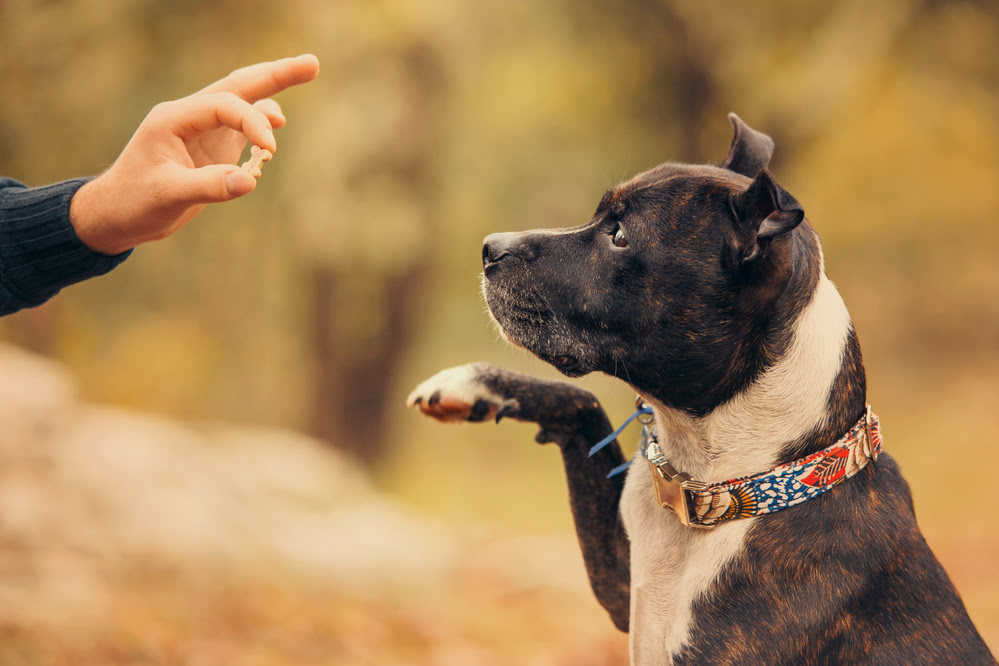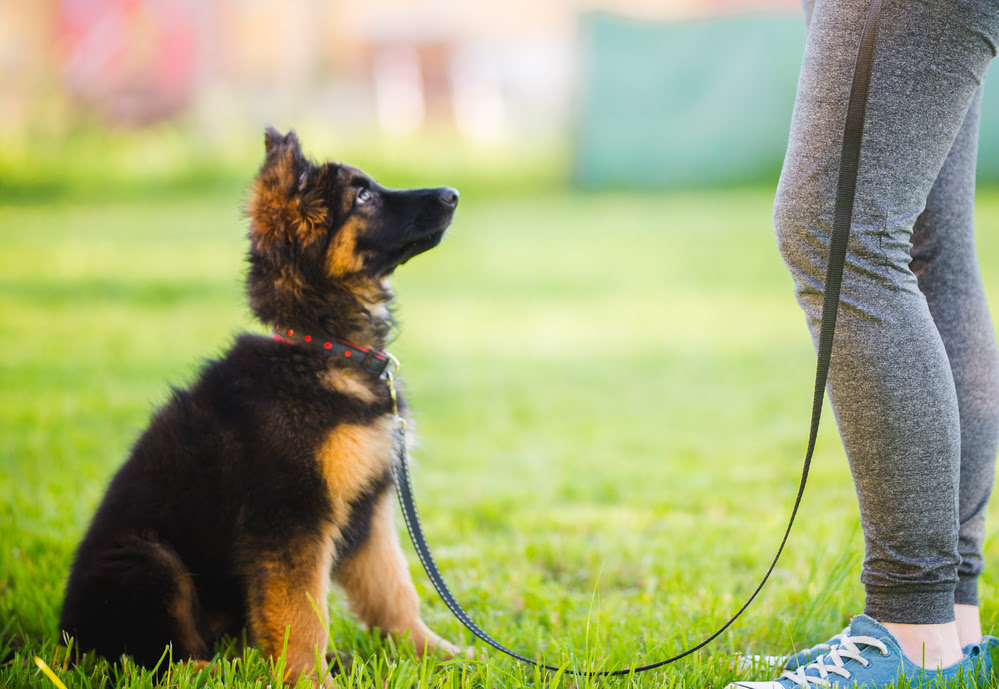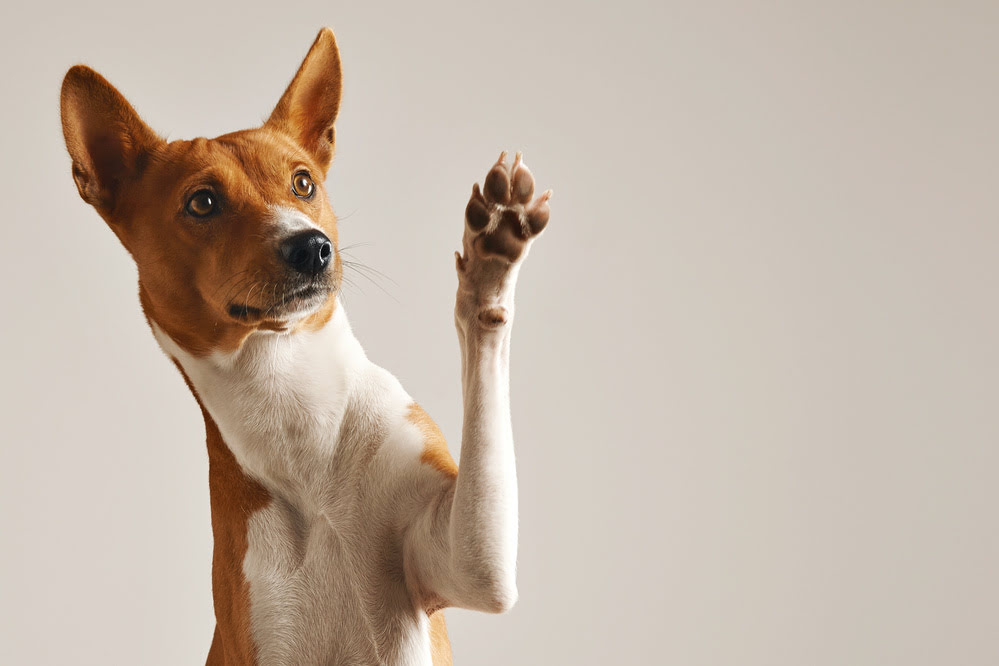Why Even Train Your Dog!?: The Importance of Training Your Furry Friends
January is national train your dog month and a perfect time to start - or continue - training your furry friend. Training dogs is essential for developing a positive relationship with them and can bring a whole host of benefits.
Puppy training helps them understand what pet owners expect from them, teaching them which behaviours are acceptable and which aren't. Doing so will also make exercising control much easier while setting clear boundaries. It also helps to keep their mind engaged and exercised boredom, resulting in fewer destructive habits & keeps dogs out of animal shelters.
Training your canine companion can even improve the health of both you and your pup by helping to teach your dog everyday manners, reducing stress levels, creating strong family bonds, and getting plenty of physical activity together!
Teach a new trick or two
With the new year comes January - national train your dog month - a great time for you and your pup to work on developing basic skills. Dog training can be a fun bonding experience for you and your pooch, & mastering even simple commands like “sit” or “roll over” can do wonders in helping reinforce behaviours inside and outside of the home.
Plus, most dogs love routines – particularly when treats are involved! With some practice and patience, even the most novice ‘pawrents’ can learn tricks such as playing dead or fetch. So don’t delay; take advantage of national train your dog month to create positive experiences with your furry sidekick.

Training Keeps Dogs In Forever Homes
Training a dog is an important step in ensuring the pet and human form a lasting bond. National Train Your Dog Month serves as an annual reminder to commit to teaching good behaviour and obedience to help foster a better relationship between pup and owner.
By reinforcing the desired behaviours regularly, owners can be certain their pet is well-behaved and that they'll provide an enjoyable companion for years to come. A variety of training methods are available, so take advantage of national Train Your Dog Month and start developing skills that will keep doggy in the home, and close to your heart.
Start at the best age for training a dog
Starting your dog training early on is the best way to ensure success for both you and your pup. January is national Train Your Dog Month, which makes it the ideal time to get into a training routine.
Puppies typically start learning as early as 8 weeks old, and attention spans begin to stretch around 6 months of age. Establishing basic commands from an early age helps puppies learn useful skills that shape their behaviour while they develop into grown-up dogs. Training at such a formative age gives puppies the opportunity to form strong connections with their owners and become well-socialized in environments outside of their homes.
Dogs that are trained at a young age prove to have more confidence when around strangers, playmates and new places, ultimately making them happier and healthier pets overall.

Begin with the 7 ‘crucial canine commands'
National Train Your Dog Month is the perfect time to teach your furry friend the seven “crucial canine commands”: 'come', 'sit', 'stand', 'down', 'stay', 'leave it', and, especially for outdoor adventuring, 'heel'.
Puppy training is essential for the well-being of both pet and parent; it’s all about building trust, creating boundaries and a sense of safety. Positive reinforcement not only helps keep everyone safe but also forms a stronger bond between you and your pup.
Let National Train Your Dog Month be your beacon in creating lifelong positive habits with your four-legged buddy!
Make dog training & commands a regular part of your pet's life
It's national train your dog month, and pet parents everywhere should take this opportunity to make dog training a regular part of their dog's life. Not only is it a great way to bond with our furry friends, but regular training can also help prevent unwanted behaviours and open the door for better communication between us and our canine companions.
Dog training doesn't have to be complicated or time consuming: even just ten minutes each day practicing commands like 'sit', 'stay', and 'no' can have a positive impact on our pet's life in the long run.
Let’s embrace national train your dog month by making the commitment of investing time in educating our dogs – they'll thank us for it!
Socialize your new puppy
Bringing a puppy into your home is an exciting and important step in establishing your relationship with them. Socializing a puppy, or teaching them acceptable behaviour, is essential for having a peaceful home life with your pooch.
Strategically introducing treats and treats-based training can help create positive experiences for the pup and promote bonding opportunities with them. The rewards will be beneficial for both you and the puppy if done correctly; puppies that are socialized early on will be better suited to adapting to changed environments and people.
If done right, treats can have much positive power when teaching obedience commands, too!

Practice patience and positive reinforcement
Practicing patience and positive reinforcement can be beneficial for teaching tricks or skills to your dog. Patience and positive reinforcement can help your pup learn new commands, socially acceptable behaviours, and develop an overall better relationship with you.
There are tons of tips to make this process fun for you and your dog such as using your voice to reward them for wanted behaviour like giving out treats for successful efforts. Allowing your pup to earn desired items makes learning enjoyable! For example, mice toys can be used as a reward when training commands like “sit” or “rollover.”
In addition to it being beneficial for teaching tricks, it is also beneficial for strengthening the bond between you and your dog, making the learning process a positive experience that will help reinforce positive behaviours in the future.
Seek help from professional dog trainers if needed
For dog owners, having a well-behaved dog can make for more peaceful family time. While some owners feel comfortable training their own dog, many turn to a professional dog trainer for help. Professional dog trainers have the experience and knowledge necessary to give the guidance dog owners need in order to successfully train their family dog.
From demonstrating proper techniques and providing helpful tips for success to ensuring behavioural challenges are resolved quickly, a professional dog trainer will offer a wide range of services that can help you get your dog up to speed when it comes to obedience and good behaviour.
If your dog needs extra assistance in achieving a balanced attitude and temperament, it may be time to look into hiring a professional dog trainer.
FAQ
What is National Train Your Dog Month?
National Train Your Dog Month is a great opportunity to set aside quality time with your furry best friend. During this month dedicated to pups and pooches, trainers around the country encourage pet owners to dedicate extra attention to their canine companions by enrolling in special classes or teaching them new tricks.
What is the purpose of National Train Your Dog Month?
National Train Your Dog Month is an annual event meant to raise awareness about the benefits of training your pup. This month-long event encourages people to take an active role in their pet's development and education, from teaching basic commands such as sit and stay, to providing them with engaging activities.
When is National Train Your Dog Month?
National Train Your Dog Month is an annual event that occurs every January.
How can I participate?
National Train Your Dog Month is an excellent time to start reinforcing good behaviour and obedience with your pup. You can find plenty of resources online to help get you started, such as guides that provide step-by-step instructions on training basics. You can even enrol in a virtual dog training class to help hone your skills further.
What are some training tips for dogs?
First and foremost, when training your dog it's important to remain consistent. Set rules for your pet, and then be sure you demonstrate these rules through verbal commands or body language each time. Make sure your dog understands what it is that you're asking of them by repeating directions or commands if necessary. Additionally, positive reinforcement, such as providing snacks or giving praise when they comply with a command, can encourage them to repeat the behaviour in the future.
What are some common behaviour problems in dogs?
Common behaviour problems in dogs can range from aggressive or anxious behaviour to destructive habits. Barking, chewing, and digging are behaviours that need to be corrected if they become disruptive. Dogs may also become overly possessive of their toys or food, especially when around strangers. Separation anxiety is another problem that some dogs struggle with, as well as difficulty going potty in the proper areas. Training can help mitigate these issues, however it is important to work with dog trainers if these problems persist beyond initial obedience exercises. Recognizing the signs of problematic behaviour is the first step towards maintaining a healthy and happy relationship between you and your pup
See if you can keep up your training until National Love your Pet Day on February 20th, let us know your results.

















Share:
Pawsome New Year’s Resolutions For You & Your Dog
How Long Can You Leave a Puppy Alone? Tips and Tricks to Help